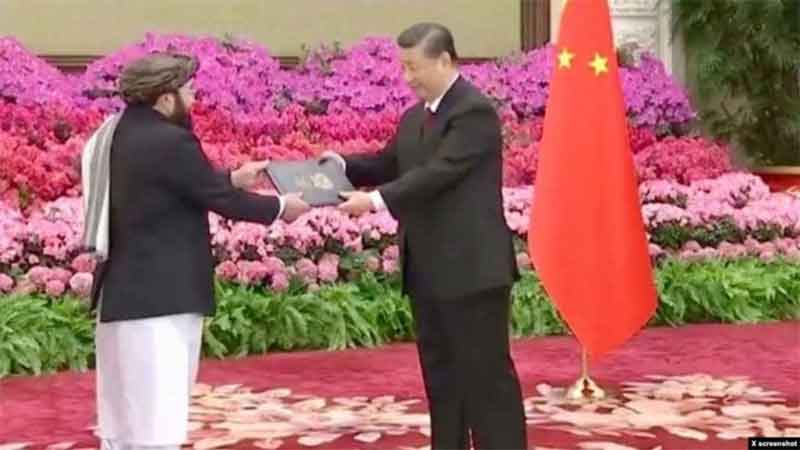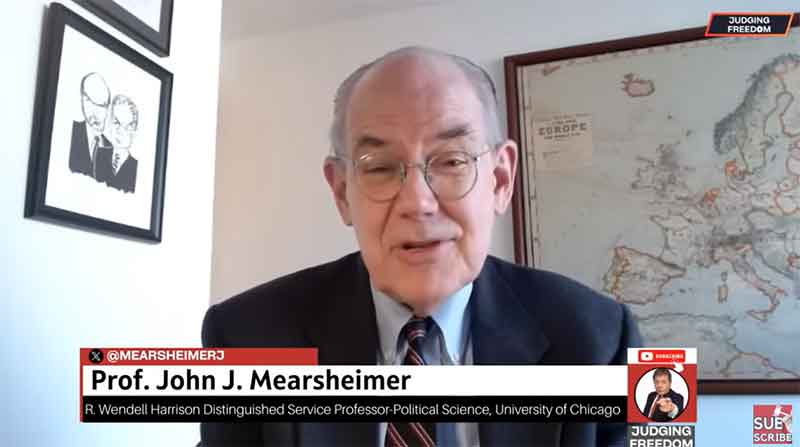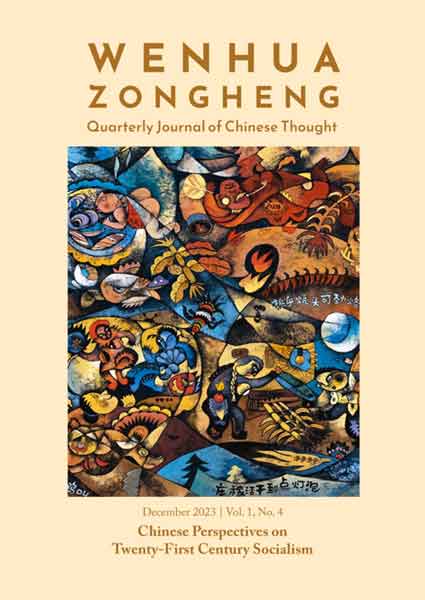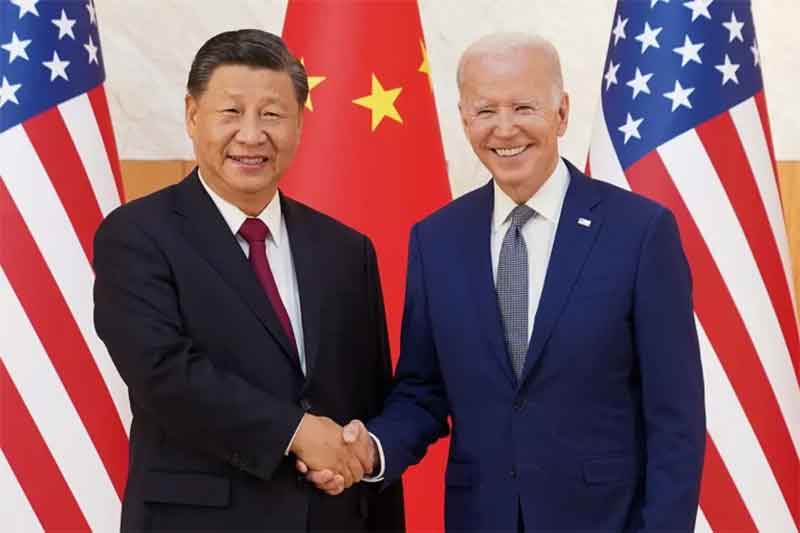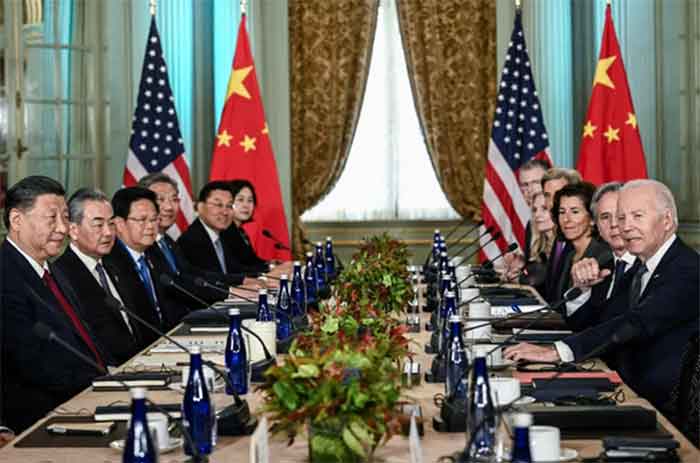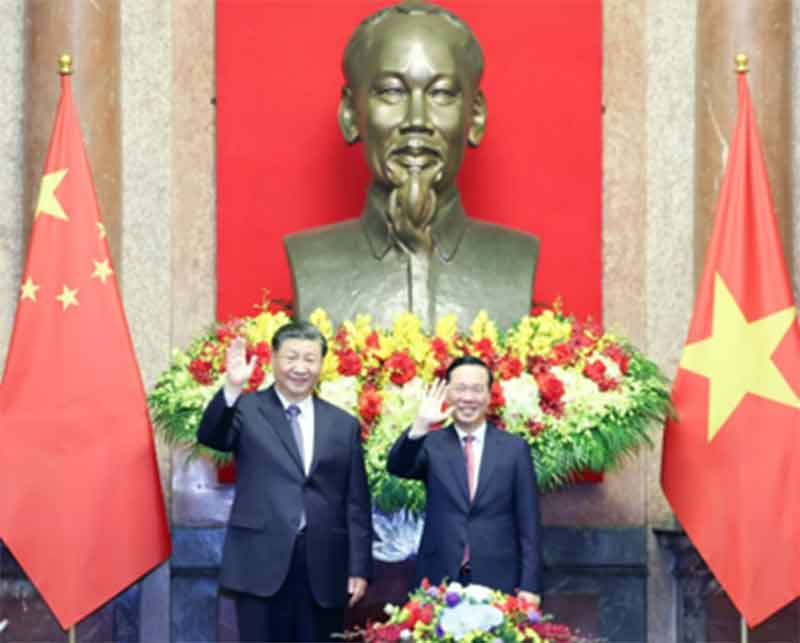
The state visit to Vietnam by Xi Jinping is the most significant political event in China-Vietnam relations this year, and has achieved tremendous success, said Chinese Foreign Minister Wang Yi on Dec 14 Thursday.
The visit indeed holds important historical significance, marking a new milestone in the relationship between the two countries. This year marks the 15th anniversary of the comprehensive strategic cooperative partnership between China and Vietnam. This report covers the significant international event, largely ignored by the Indian media, a setback to US’ efforts to expand its hegemony to Asia and its designs for an Asian NATO.
The composition of both delegations, which included top leaders of the both governments and ruling communist parties (CPC and CPV), indicated the importance and scope of the ‘Xi’s first state visit in six years, seeking to strengthen ties between the communist neighbours even as Hanoi deepens diplomatic relations with Western countries.
The China Vietnam parleys assume significance in the context of US efforts to stage an Ukraine in the Asia Pacific by inflaming Taiwan, and by efforts to rope in Vietnam too, exploiting its territorial dispute with China.
Xi and CPV Chief Nguyen Phu Trong agreed on the new characterization of the elevated relationship between the two parties and two countries — jointly building a “ Vietnam-China community with a shared future that carries strategic significance”, a key formulation underlined in all documents, and reports of the visit.
As to the context, Reuters reported: ‘The visit comes three months after United States President Joe Biden travelled to Vietnam as the major powers vie for influence in the Southeast Asian nation.’ During Biden’s September visit, Vietnam and the US jointly warned against the “threat or use of force” in the South China Sea.
“In September, Biden asserted that stronger ties with Vietnam were not about countering China, though US diplomacy across Asia and the Pacific has been focused on improving defence ties with countries to do just that.”
*** ***
Asia Pacific strategy of USA checkmated
“US War Planners Court China’s Neighbors,” wrote Marcy Winograd, jointly with Wei Yu (Coordinator of CODEPINK’s “China is Not our Enemy” campaign). (https://countercurrents.org/2023/04/us-war-planners-court-chinas-neighbors-what-would-buddha-say/, 01/04/2023).
Biden wooed Vietnam as part of that plan. And that is what Xi sought to counter.
Xi’s is a visit that has a crucial role to play in war and peace in Far East at a time Pentagon stepped up its war games in the Asia Pacific. In anticipation of a military confrontation, President Biden’s 2024 budget had allotted $9 billion for the Indo-Pacific Deterrence Initiative, to solidify regional allies–Japan, South Korea, the Philippines, Australia and Thailand–in what the Pentagon calls a network to enforce the ‘international rules-based order’: This ‘order’ is a euphemism for US hegemony, as different from UN charter, backed by China and the Global South.
China describes the US initiative as a NATO-like alliance. To justify such an alliance, China is projected by the US as ‘the threat’ which is a lie.
The boot is on the other leg: The US already has 250 military bases surrounding China. China has no military presence in the Western Hemisphere.
*** ***
Xi visit comes ahead of a crucial election in Taiwan
As to the context, Xi’s visit comes a few weeks before Taiwan elections that hold uncertainties for peace, and seeks to neutralize the US designs in Far east:
Several times President Biden has said the US would intervene militarily to “defend” Taiwan against reunification with China, and last year he signed legislation to ship $10 billion worth of weapons to Taiwan. In US strategy, Ukraine is the proxy aimed to undermine its rival Russia. Taiwan is the next Ukraine, the US wants to use it to undermine China.
Taiwan’s Presidential election on January 13 is crucial: forces of ‘peace with China’ ( Kuomintang, KMT), a predominant force for decades, are sought to be defeated by US-backed political forces, led by the Democratic Progressive Party(DPP); war and peace in Taiwan is the most crucial issue in the election. That is apart from US efforts to undermine China’s place in global supply chains.
It is not as if anti-China forces have been the leading force in Taiwan: The KMT in 2022 had won control of 14 of Taiwan’s 22 cities and counties, including four of Taiwan’s six biggest metropolitan areas where nearly 70 percent of Taiwan’s people live. The Democratic Progressive Party(DPP), which controls the central government, had won only five cities and counties. US House speaker Nancy Pelosi’s controversial visit and meeting with Taiwan President Tsai Ing wen had ignited the Far East not long ago. Now a US protege, former envoy to USA, Hsiao Bi-khim has been roped in as Vice-Presidential running mate to Lai ching-te, the DPP’s Presidential candidate.
China-Vietnam relations, amid such circumstances, have a significant role in Far east.
*** ***
US wooed Vietnam that has a one-party communist rule
Vietnam like China has a one-party rule by Communists ever since its birth, but it is no anathema to USA. Vietnam, strong in economy and a formidable military power, also had no problem supping with USA. That is real politic on both sides.
Reuters reported:
Vietnam has long pursued a “bamboo diplomacy” approach, striving to stay on good terms with both powers. It shares US concerns about Beijing’s increasing assertiveness in the contested South China Sea, but it also has political commonality and close economic ties with China.
Vietnam and China already share a “comprehensive strategic partnership”, Vietnam’s highest diplomatic status. Hanoi and Washington upgraded their relationship to the same level in September. All this was neutralized by Xi visit, which had a good economic component too:
The two sides signed 37 agreements, including on cross-border rail development and trade. The two countries have also agreed to conduct joint patrols in the Tonkin Gulf, according to reporters who witnessed the signing ceremony.
China has been Vietnam’s largest trading partner for several years, with a bilateral trade turnover of $175.6bn in 2022. Imports from China, including crucial inputs for Vietnam’s manufacturing sector, make up 67 percent, according to Vietnam customs data cited by Vietnamese state media. China has more than $26 bn invested in Vietnam, with some 4,000 active projects.
Xi’s last visit to Vietnam in 2017 was for an Asia-Pacific economic summit in the coastal city of Danang.
*** ***
“Asia’s future is in the hands of no one but Asians” : Xi
America has been eyeing at an Asian NATO, as part of its Asia-Pacific strategy, now countered by China by uniting with Vietnam, also by invoking their ideological commitments to counter hegemonism.
In an opinion piece published in Vietnam’s Nhan Dan newspaper before the visit on Tuesday, Xi wrote: “Asia’s future is in the hands of no one but Asians.”
Xi had recently extended an olive branch to another Asian major, Japan:
He took initiative to have a face-to-face meet with Japan’s PM Fumio Kishida on the sidelines of APEC Summit last November in San Francisco, and proposed to “pursue mutually beneficial relations.” They agreed to have “high level dialog” in future.
“Their countries should “focus on common interests” and reaffirm a “strategic relationship of mutual benefit and give it new meaning”, Xi told Kishida as they sat opposite one another at a long table flanked by their delegations.” ( Reuters, Nov 16, 2023).
Thus China used its strong economy, ‘dollar diplomacy’, to woo even the QUAD partner Japan, which has high stakes in Asia.
Even Australian PM had reached out to China and met Xi in early November, after a seven years of gap. “There is no single market or collection of markets that was able to replace what we lost in China,” said Australia (CNBC, Nov 29).
Both Japan and Australia, QUAD partners, as also Aukus ally UK, voted for “immediate humanitarian ceasefire” in Gaza, together with an overwhelming majority of 153 countries in UN General Assembly on Dec 12, (up from 121 on October 27); earlier they had abstained. Even QUAD partner India,sensing its being isolated in the Global South, decided in the last minute, and likewise voted, differently from USA in the latest ceasefire resolution on Gaza.
It is only India led by Modi, however, that has been tailing US imperialist super power, as its junior partner, and spurning even ‘normal’, thogh not friendly, relations with China.
China earlier held a summit meet with ministers from Saudi Arabia, Egypt, Jordan, the Palestinian Authority and Indonesia ( November 20, 2023) on Gaza war by Israel, before they proceeded to UN and its Security Council with some proposals. The ministerial committee, in an Asian initiative, stressed the need for an immediate stop to “military escalation” in Gaza and to propel the political process forward with the goal of lasting peace, as well as “hold the Israeli occupation accountable for the blatant violations and crimes in the Gaza Strip and occupied West Bank,” according to a statement published by the Saudi foreign ministry on X, formerly known as Twitter.
China has long backed the Palestinians and been quick to denounce Israel over its settlements in the occupied territories. It has not criticized the initial Hamas attack on Oct.7 — which killed thousands of civilians — while the United States and others have called it an act of terrorism. However, China does have growing economic ties with Israel, reported AP.
That came on top of the earlier (March 10,2023) historic truce, mediated by China, between Iran and Saudi Arabia, sectarian rivals for centuries.
These moves by China in Asia, including the latest with Vietnam, helped to unite forces against US hegemony, and countered US efforts to build an Asian Nato with Xi’s slogan: “Asia’s future is in the hands of no one but Asians.”
*** ***
“To avert the risk of a “colour revolution”
US had stepped up its ideological offensive against communism to cover up its hegemonic ambitions. The Xi visit was a significant counter to that.
Ukraine war was preceded by regime change, a coup, there, it may be recalled.
In a 16-page joint statement (See Appendix), the two countries vowed to work more closely to strengthen defence industry ties and intelligence exchanges.
Reuters added:
They said their aim was partly to avert the risk of what they called a “colour revolution” promoted by hostile forces, using a term for popular uprisings that have shaken former Communist nations.
South China Morning Post (SCMP) thatalso mentioned “colour revolution” reported:
Xi tells top officials that both sides should oppose any attempt to ‘mess up’ the Asia-Pacific, a veiled reference to the US Indo-Pacific strategy.
Hanoi was Xi’s fourth overseas trip this year after visits to Russia, South Africa and the United States. Beijing had been pushing for improved strategic ties with Vietnam after a recent upgrade in US–Vietnam ties.
The current visit belied US hopes. SCMP report continued:
In their joint statement released on Dec 13, China and Vietnam agreed to raise ties to a new stage of “greater political mutual trust, more substantive security cooperation, deeper practical cooperation, firmer social foundation, closer multilateral coordination, and better management of differences”.
They also promised to boost security cooperation and intelligence sharing, with an eye on the risks of the so-called “colour revolution” posed by “hostile forces”.
US was pinning its hopes on aggravating differences in South China Sea, but the Xi visit effectively countered it. SCMP said:
Regarding “maritime differences”, the two countries said they would seek basic and long-term solutions acceptable to both sides.
Including Vietnam in the bilateral communities of a “shared future” – which also include Laos, Myanmar, Thailand, Malaysia, Pakistan, Mongolia and South Africa – was seen as a major diplomatic goal for Xi’s visit.
During the meeting with Chinh on Dec 13 Wednesday, Xi hailed the newly minted relationship, which carried strategic significance between the two countries.
“It fully shows the extraordinary breadth and depth of China-Vietnam relations,” according to Chinese state broadcaster CCTV.
Xi also called for closer coordination on international and regional issues, and attributed the successes of China and Vietnam partially to a largely peaceful environment in the Asia-Pacific, which now the US was seeking to undo. China increasingly rallied the Global South, as it id recently in UN in relation to Israel’s aggressive war.
*** ***
China- Vietnam relations take a turn?
The Xi visit gave a clear indication that US’ hopes to fish in troubled waters, and woo Vietnam against China were belied. Vietnam responded positively, stating its “priorities”, and said differences will be sorted out.
US moves to fish in troubled waters is countered by the visit as seen in the CNN report:
In his remarks, Xi said China and Vietnam should “turn challenges posed by maritime issues into opportunities of bilateral cooperation.”
At a summit in Hanoi, Chinese leader Xi Jinping and Vietnamese Communist Party chief Nguyen Phu Trong called for the bolstering of their strategic relationship and agreed to cooperate on issues ranging from maritime patrols to trade and crime prevention, in what Chinese state media hailed as a “new positioning of relations” between the Communist-ruled neighbors.
Trong called Xi’s two-day visit to the capital “a new historic milestone,” which would take the relations between the two Communist parties and countries “to a new height,” according to state-run Vietnam News Agency (VNA).
The two sides agreed to “unceasingly consolidate political trust,” and build ties “on the basis of mutual respect, equal and win-win cooperation” with respect for each other’s “independence, sovereignty and territorial integrity,” the Vietnamese report said:
“China would like to step up multilateral cooperation with Vietnam … increase the voice and influence of developing countries in international affairs,” Xi told Trong, the Vietnamese party chief, on Dec 12 Tuesday.
Trong said that Hanoi considered cultivating relations with China “a top priority and a strategic choice” while reaffirming that it would continue its foreign policy directions of independence, self-reliance, peace, cooperation and development, according to Vietnamese reports.
The two countries have robust economic exchanges but have also been at odds with each other over territorial claims in the South China Sea. When he met Hue, Xi noted that differences on maritime issues must be “managed properly”, adding that the two sides must explore opportunities for maritime cooperation and joint development.
Among those areas of agreement inked Dec 12 Tuesday were plans for joint military patrols in the Gulf of Tonkin in the South China Sea and the establishment of a hotline for communication about “unexpected incidents arising from fisheries activities at sea,” according to VNA.
China and Vietnam have engaged in patrols in the demarcated Gulf of Tonkin in the past and as recently as earlier this month, according to Vietnam’s national radio broadcaster.
Speaking during his meeting with Xi, Trong called for both countries to “respect each other’s legal and legitimate interests; not to complicate the situation; settle disputes via peaceful measures in accordance with international laws,” according to VNA.
https://edition.cnn.com/2023/12/13/china/china-xi-jinping-vietnam-visit-intl-hnk/index.html
A “community with a shared future” between the two countries would have strategic significance, Xi added, while warning against rising “hegemonism” in the world, an apparent reference to the US, though he did not name it.
*** ***
Ideological gloss to US hegemony
US has been adding an ideological gloss to its hegemony, and explicitly said the ruling communist party of China (CPC) is a threat to world peace, even while wooing Communist Vietnam.
An America that plays havoc with its CIA-Pentagon, IMF, sanctions, wars, regime change policies and coups, invoking ideology, says that China, and its communist party, are the greatest threat to national security of USA, to the whole world and to peace. FBI Director Christopher Wray (July 7, 2020) had said: “ So, when I speak of the threat from China, I mean the government of China and the Chinese Communist Party…”
The anti-communist ideological offensive by USA, which sought to drive a wedge between China and Vietnam, was checked in its tracks. The South China Sea was an area US was seeking to fish in troubled waters, but the current visit checkmated that.
President Vo Van Thuong said that Xi’s state visit to Vietnam is a major event long-expected by the CPV, the government of Vietnam and the Vietnamese people, and a major historic event in Vietnam-China relations.
Noting that the general secretaries of the two parties agreed to build a China-Vietnam community with a shared future that carries strategic significance, he said that this has set the direction for the future development of the bilateral relationship and will surely take it to a new stage of higher-level development.
China and Vietnam thus revived and activated their comradeship, and took it down to people, young generation in particular.
Vietnam significantly has a new crop of leaders elected in recent years,and the current visit was focused on that generation. Thus, relations between the two countries, peoples and ruling communist parties were cemented during the visit of December 12-13 that addressed the differences too.
China and Vietnamissued a joint statementon “further deepening and elevating the comprehensive strategic cooperative partnership and building a Vietnam-China community with a shared future that carries strategic significance.” This formulation is repeated through all related documents, and reports.
The joint statement, mentioned compatible ideology and noted:
The two sides hold that Vietnam and China are good neighbours, good friends, good comrades, and good partners, and both are socialist countries under the leadership of a communist party, with similar political regimes, compatible ideology and belief, similar development path, shared vision, shared future, and common efforts for happy people and a wealthy and strong country and for the noble cause of peace and progress of mankind.
‘Let us carry forward the revolutionary friendship between the two countries’: Xi
Xi Jinping said.
Vietnam supports “One China” policy
Leaving no room to fishing by USA, the Joint statement said:
“Vietnam reaffirms its consistency in carrying out “One China” policy by recognising Taiwan as an inseparable part of the Chinese territory, resolutely opposing any separatist activity seeking “Taiwan Independence”, supporting the principle of non-interference in internal affairs of other states, and not developing any state-level relations with Taiwan.
“ The Vietnamese side holds that the issues of Hong Kong, Xinjiang and Xizang are China’s internal affairs, and expresses the belief that under the leadership of the Chinese Party and Government, the above-mentioned regions will maintain stability and prosperous development. The Chinese side supports Vietnam’s efforts in maintaining social stability, ensuring national security, and promoting national solidarity.”
Xi recalled and invoked the historical unity and noted that China and Vietnam share the same political system, similar aspirations and philosophies and an intertwined future. Relations with each other hold a special place in their respective party-to-party and state-to-state relations. Over the past 73 years since the establishment of diplomatic relations, he said, the traditional friendship between China and Vietnam has been further enriched through mutual support and assistance in the struggle for national independence and liberation, and further deepened as the two sides move forward comprehensive strategic cooperation to advance the socialist causes.
Xi underscored the ideological unity:
China and Vietnam are both socialist countries under the leadership of a communist party. It is their shared responsibility and mission to safeguard the security of the political system and defend the cause of socialism. The two sides should strengthen solidarity, stay committed to openness and mutual benefits, jointly guard against external infiltration and sabotage attempts, and make due contributions to strengthening world socialist forces and promoting peace and the progress of humanity.
The visit marked a significant milestone, acknowledged by Vietnam’s leaders, in resolving differences too. In his meeting with Chairman of the National Assembly of Vietnam Vuong Dinh Hue, Xi said the two sides should ensure sound steering of the bilateral relationship, advance practical cooperation and properly managing problems and differences.
*** ***
US attempts at driving a wedge between China and Vietnam countered
The Vietnamese side was notably explicit in conveying a change in their attitude towards China:
This visit takes forward the special friendship of camaraderie plus brotherhood forged by the older-generation leaders, Mao Zedong and Ho Chi Minh, and will steer the relationship in the direction of steady development in the long run and toward a brighter future, Hue said.
The Vietnamese side said it identifies with the CPC on its governance philosophy, sincerely congratulates China on its remarkable achievements, and firmly believes that China will realize the goal of building a great modern socialist country in all respects as scheduled.
Vietnam’s National Assembly will follow through on the important common understandings of the two general secretaries, step up exchange and cooperation with the NPC on democracy, rule of law and anti-corruption, further build consensus across the sectors, consolidate the traditional friendship and strategic mutual trust between the two countries, and cement the popular foundation of building a Vietnam-China community with a shared future, Hue said.
The profound traditional friendship between Vietnam and China, forged by the older generation of the two sides, has stood the test of the evolving international dynamics and become a shared asset of the two peoples, he added.
Amid the complex transformation of the international landscape, both Vietnam and China are at a critical development stage, the Vietnamese president said, adding that it is therefore the shared aspiration of the Vietnamese and Chinese people to consolidate and strengthen the trust and cooperation between the two parties and two countries, and continuously advance the socialist cause of the two countries.
Vo Van Thuong once again congratulated China on the success of the third Belt and Road Forum for International Cooperation and expressed ideological unity and confidence that under the leadership of the CPC Central Committee with Xi at its core and the guidance of Xi Jinping Thought on Socialism with Chinese Characteristics for a New Era, China will surely achieve the goals set at the 20th CPC National Congress.
Highlighting China’s development and success will be a huge inspiration and support for Vietnam, the president said that the Vietnamese side will earnestly implement the important consensus of the general secretaries of the two parties, fully leverage the unique advantage of the two countries in sharing the same social system and similar ideals and philosophies, strengthen experience exchange in the party and state governance, comprehensively advance practical cooperation in various fields including politics, economy and trade, people-to-people exchanges and security, uphold national political security, and facilitate industrialization and modernization.
The Vietnamese side stands ready to properly address maritime differences under the spirit of mutual respect and win-win cooperation and push for the steady progress of the Vietnam-China community with a shared future, he added.
Noting that the initiatives on global development, security and civilization proposed by President Xi demonstrate the sense of responsibility of a major country and a major party, as well as China’s important role in leading international development and cooperation, Vo Van Thuong said Vietnam is ready to be actively involved and will enhance international coordination with China to jointly make new contributions to world peace and stability and the progress and well-being of humanity.
Xi highlighted the need for the two sides to, under the new circumstances, move forward on the path of friendship and cooperation from the strategic and long-term perspective of the relationship. And mutual economic interests were taken care of.
It is also a major historic decision made by the leadership of the two parties and countries, bearing in mind the larger interests of the long-term development of China-Vietnam relations and the strategic overall picture of solidarity of socialist forces in the world, and it meets the common needs of China and Vietnam to advance their respective modernization and serves the common interests of the two peoples.
Focusing on the six major goals of greater political mutual trust, more substantive security cooperation, deeper practical cooperation, more solid popular foundation, closer multilateral coordination and collaboration, and more proper management of differences, the two sides need to continue to develop the bilateral relationship in new historical contexts, and jointly advance the China-Vietnam community with a shared future that carries strategic significance to bring about more benefits to the two peoples, Xi said.
Xi stressed the economic foundation, the younger generation and said:
The two sides need to strengthen top-level design, ensure the sound implementation of the outline program for synergizing the Belt and Road Initiative and the Two Corridors and One Economic Circle strategy, speed up infrastructure connectivity, and expand the export of quality agricultural products from Vietnam to China. Cooperation should also be enhanced in the digital economy and green development to explore new growth drivers for bilateral practical cooperation.
We should step up public awareness campaigns on the traditional friendship …to build more bridges for exchange between the two peoples, especially between the younger generation, to deepen mutual understanding and friendship.
South China Sea has been an issue the US has been harping on. And the Xi visit sought to nullify that, which will help peace in the region and across the world.
As important coastal countries of the South China Sea, China and Vietnam share common interests and shoulder common responsibilities in safeguarding peace and stability in the South China Sea. China, Xi assured, will strengthen communication and coordination with Vietnam to find long-term solutions to maritime issues that both sides can accept, work with all parties for an early conclusion on a substantive and effective Code of Conduct in the South China Sea, and make greater contributions to regional peace and stability.
*** ***
Ramakrishnan is a political observer who contributed articles to countercurrents.org, a distinguished magazine committed to the cause of opposing imperialism and supporting world peace, including a series on India-China relations, like …
Modi’s precept “this is not an era of war,” should be applied to China and Pakistan as well : Normalization, not chauvinism, is the need of the hour
India-China War, 1962: Recalling the story of the historic, unilateral ceasefire… in search of peace and development
Disinformation, a key instrument of India’s foreign policy in relation to China and Pakistan?

